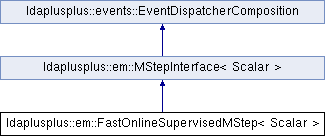|
LDA++
|
|
LDA++
|
#include <FastOnlineSupervisedMStep.hpp>

Public Member Functions | |
| FastOnlineSupervisedMStep (VectorX class_weights, Scalar regularization_penalty=1e-2, size_t minibatch_size=128, Scalar eta_momentum=0.9, Scalar eta_learning_rate=0.01, Scalar beta_weight=0.9) | |
| FastOnlineSupervisedMStep (size_t num_classes, Scalar regularization_penalty=1e-2, size_t minibatch_size=128, Scalar eta_momentum=0.9, Scalar eta_learning_rate=0.01, Scalar beta_weight=0.9) | |
| virtual void | m_step (std::shared_ptr< parameters::Parameters > parameters) override |
| virtual void | doc_m_step (const std::shared_ptr< corpus::Document > doc, const std::shared_ptr< parameters::Parameters > v_parameters, std::shared_ptr< parameters::Parameters > m_parameters) override |
 Public Member Functions inherited from ldaplusplus::events::EventDispatcherComposition Public Member Functions inherited from ldaplusplus::events::EventDispatcherComposition | |
| std::shared_ptr< EventDispatcherInterface > | get_event_dispatcher () |
| void | set_event_dispatcher (std::shared_ptr< EventDispatcherInterface > dispatcher) |
FastOnlineSupervisedMStep is an online implementation of the fsLDA.
m_step() is called by doc_m_step() according to the minibatch_size constructor parameter thus the model parameters are updated many times in an EM step.
Each m_step() updates the \(\eta\) parameters using an SGD with momentum update and the \(\beta\) using the equation \(\beta_{n+1} = w_{\beta} \beta_{n} + (1-w_{\beta}) * MLE\).
In the maximization with respect to \(\eta\) the first order taylor approximation to the expectation of the log normalizer is used as in the FastSupervisedMStep.
| ldaplusplus::em::FastOnlineSupervisedMStep< Scalar >::FastOnlineSupervisedMStep | ( | VectorX | class_weights, |
| Scalar | regularization_penalty = 1e-2, |
||
| size_t | minibatch_size = 128, |
||
| Scalar | eta_momentum = 0.9, |
||
| Scalar | eta_learning_rate = 0.01, |
||
| Scalar | beta_weight = 0.9 |
||
| ) |
Create an FastOnlineSupervisedMStep that accounts for class imbalance by weighting the classes.
| class_weights | Weights to account for class imbalance |
| regularization_penalty | The L2 penalty for the logistic regression |
| minibatch_size | After that many documents call m_step() |
| eta_momentum | The momentum for the SGD update of \(\eta\) |
| eta_learning_rate | The learning rate for the SGD update of \(\eta\) |
| beta_weight | The weight for the online update of \(\beta\) |
| ldaplusplus::em::FastOnlineSupervisedMStep< Scalar >::FastOnlineSupervisedMStep | ( | size_t | num_classes, |
| Scalar | regularization_penalty = 1e-2, |
||
| size_t | minibatch_size = 128, |
||
| Scalar | eta_momentum = 0.9, |
||
| Scalar | eta_learning_rate = 0.01, |
||
| Scalar | beta_weight = 0.9 |
||
| ) |
Create an FastOnlineSupervisedMStep that uses uniform weights for the classes.
| num_classes | The number of classes |
| regularization_penalty | The L2 penalty for the logistic regression |
| minibatch_size | After that many documents call m_step() |
| eta_momentum | The momentum for the SGD update of \(\eta\) |
| eta_learning_rate | The learning rate for the SGD update of \(\eta\) |
| beta_weight | The weight for the online update of \(\beta\) |
|
overridevirtual |
This function calculates all necessary parameters, that will be used for the maximazation step. And after seeing minibatch_size documents actually calls the m_step.
| doc | A single document |
| v_parameters | The variational parameters used in m-step in order to maximize model parameters |
| m_parameters | Model parameters, used as output in case of online methods |
Implements ldaplusplus::em::MStepInterface< Scalar >.
|
overridevirtual |
Maximize the ELBO.This function usually changes the passed in parameters.
| parameters | Model parameters (maybe changed after call) |
Implements ldaplusplus::em::MStepInterface< Scalar >.
 1.8.11
1.8.11